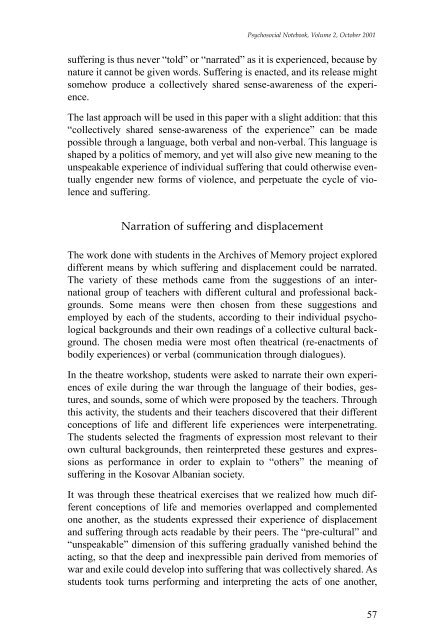Psychosocial Notebook - IOM Publications - International ...
Psychosocial Notebook - IOM Publications - International ...
Psychosocial Notebook - IOM Publications - International ...
Create successful ePaper yourself
Turn your PDF publications into a flip-book with our unique Google optimized e-Paper software.
<strong>Psychosocial</strong> <strong>Notebook</strong>, Volume 2, October 2001<br />
suffering is thus never “told” or “narrated” as it is experienced, because by<br />
nature it cannot be given words. Suffering is enacted, and its release might<br />
somehow produce a collectively shared sense-awareness of the experience.<br />
The last approach will be used in this paper with a slight addition: that this<br />
“collectively shared sense-awareness of the experience” can be made<br />
possible through a language, both verbal and non-verbal. This language is<br />
shaped by a politics of memory, and yet will also give new meaning to the<br />
unspeakable experience of individual suffering that could otherwise eventually<br />
engender new forms of violence, and perpetuate the cycle of violence<br />
and suffering.<br />
Narration of suffering and displacement<br />
The work done with students in the Archives of Memory project explored<br />
different means by which suffering and displacement could be narrated.<br />
The variety of these methods came from the suggestions of an international<br />
group of teachers with different cultural and professional backgrounds.<br />
Some means were then chosen from these suggestions and<br />
employed by each of the students, according to their individual psychological<br />
backgrounds and their own readings of a collective cultural background.<br />
The chosen media were most often theatrical (re-enactments of<br />
bodily experiences) or verbal (communication through dialogues).<br />
In the theatre workshop, students were asked to narrate their own experiences<br />
of exile during the war through the language of their bodies, gestures,<br />
and sounds, some of which were proposed by the teachers. Through<br />
this activity, the students and their teachers discovered that their different<br />
conceptions of life and different life experiences were interpenetrating.<br />
The students selected the fragments of expression most relevant to their<br />
own cultural backgrounds, then reinterpreted these gestures and expressions<br />
as performance in order to explain to “others” the meaning of<br />
suffering in the Kosovar Albanian society.<br />
It was through these theatrical exercises that we realized how much different<br />
conceptions of life and memories overlapped and complemented<br />
one another, as the students expressed their experience of displacement<br />
and suffering through acts readable by their peers. The “pre-cultural” and<br />
“unspeakable” dimension of this suffering gradually vanished behind the<br />
acting, so that the deep and inexpressible pain derived from memories of<br />
war and exile could develop into suffering that was collectively shared. As<br />
students took turns performing and interpreting the acts of one another,<br />
57

















